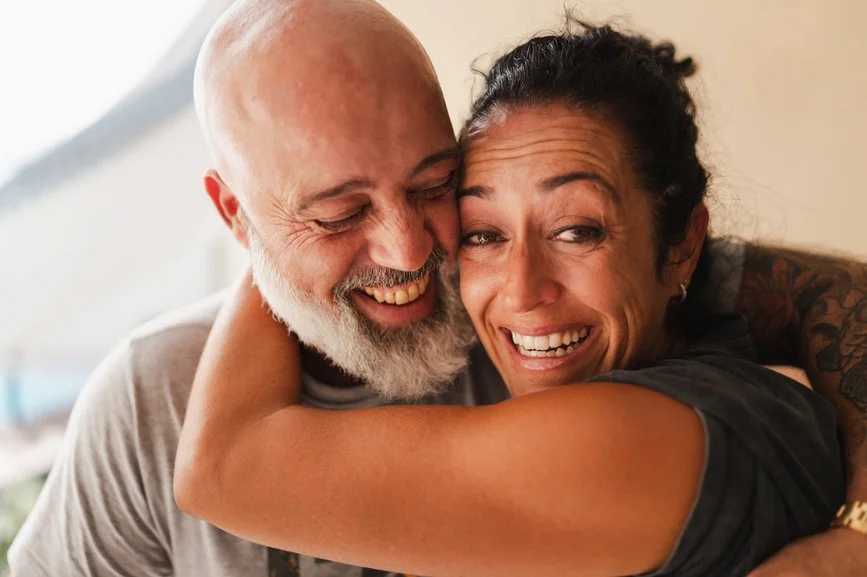Because here's what most couples don't understand: Appreciation in marriage isn't about being polite. It's about strategic reinforcement of the behaviors you want more of. And the research—from marriage counseling studies, animal behavior, organizational leadership—all points to the same conclusion: positive reinforcement doesn't just make your spouse feel good. It literally shapes behavior in ways that punishment and criticism never can.
Supporting Your Partner Through Difficult Family Dynamics
Why Parenting Conflicts Between Partners Are So Intense (And What to Do About Them)
And just like that, we're off. What started as a disagreement about bedtime routines has become a referendum on who's the better parent, who cares more, who's damaging the kids.
Parenting conflicts between partners aren't just disagreements—they're some of the most emotionally loaded fights couples have…
Coming Back After an Affair: What It Really Takes
This is what an affair does. You left them by the side of the road. And now, if you want any chance of rebuilding this relationship, you have to come back for them. Not just once. Not just with an apology. You have to come back over and over and over again—with patience, with empathy, with a willingness to sit in the wreckage of what you've caused.
How Taking Ownership Of Your Actions Can Transform Your Relationship
You can’t have a healthy relationship without accountability.
It’s that simple — and that hard.
It’s easy to point the finger at your partner, to focus on what they need to do differently. But real change begins when you’re willing to look at yourself — your tone, your reactions, the ways you protect yourself that also hurt the person you love.
When you take ownership of your part, you stop being a victim of the relationship and start becoming a participant in its healing.
How "I'm the Logical One and They're the Emotional One" Can Be a Form of Avoidance
Here's what the "logical" partner will often say to me when the other steps out: "Look, I'm just the logical one in the relationship. They're the emotional one. That's how we work. I keep things calm, they feel things deeply. It's just our dynamic."
And here's what I need to say—and maybe to you, if you've ever said something similar:
That's not a dynamic. That's avoidance.
It's Not Going Backwards in Your Relationship—It's Just Imperfect Action
Let me tell you what one of my goals is for every couple that walks through my door:
I want you both to get really, really good at imperfect action.
Not perfect communication. Not flawless vulnerability. Not ideal conflict resolution.
What is imperfect Action? Clumsy attempts. Awkward apologies. Moments of vulnerability that dissolve into defensiveness halfway through. Trying something new and landing it badly.
The Forgotten Birthday:Why Rituals Matter and How to Have the Real Conversation
…And they're off—locked into an argument that feels familiar, infuriating, and completely beside the point.
The Fight You're Having Isn't the Fight You Need to Have
Let me be direct: This argument about calendars and ADHD is a waste of both of your time and energy.
From a Relational Life Therapy perspective, both Sarah and Mike are operating from their "adaptive child" parts—the reactive, self-protective parts of themselves that show up when they feel threatened. Sarah is criticizing and blaming. Mike is defending and deflecting. Neither one is accessing their "wise adult"—the part that can be honest, vulnerable, and accountable.
A Better Way to Apologize: Intention Over Perfection
Here's what I wish more couples understood about apologies: they don't have to be perfect to be powerful.
I've watched countless couples get stuck in the same cycle. One partner messes up. The other partner waits for an apology. The first partner either doesn't apologize at all, or gives an apology that lands with a thud. Then both people feel more frustrated than before.
The problem isn't usually a lack of caring. It's that most of us were never actually taught how to apologize in a way that helps our partner feel truly heard and validated.
The Unfair Truth: You Have to Do the Hard Work Even When You're the One Who Got Hurt
Let me name something that nobody wants to hear but everyone needs to understand: sometimes the hardest part about healing your relationship is that you were the one who got hurt, and now you have to do the hard work of healing.
It feels deeply unfair. And you know what? It is.
You're the one who was betrayed, dismissed, abandoned, or wounded. You're the one who's been carrying this pain. And now someone's telling you that you need to step up and actively participate in the healing process?
Yes. And I know how much that stings.
Why Defensiveness Doesn’t Work (and What to Do Instead)
Most people become defensive with good intentions.
You’re not trying to start a fight—you’re trying to end one.
You’re trying to get your partner to understand where you’re coming from.
To see your side of the story.
To realize that they’ve misunderstood you.
But here’s the problem:
Defensiveness doesn’t stop arguments.
It fuels them.
When Both of You Need Help: Staying Connected Through Struggles
In most couples, there are moments when one partner needs extra support. But what happens when both of you are in that space? When you’re both navigating difficult terrain—be it mental health challenges, stressful work situations, aging parents, or the relentless demands of parenting—how do you stay connected while you both need help?
This isn’t just hard. It’s messy. It’s vulnerable. And—if you can navigate it—it’s deeply meaningful.
Emotional Safety Is the Foreplay Most Couples Skip
When couples talk about a "lack of desire," they often assume something is wrong in the bedroom. But more often, the problem started long before anyone took their clothes off.
Desire Needs a Safe Place to Land
Desire thrives in a climate of emotional safety—where you feel respected, known, and accepted. If you feel emotionally exposed or chronically misunderstood, it’s incredibly hard to want intimacy.
Say What You Really Feel: Why Sharing Primary Emotions Brings You Closer
There’s a moment in every hard conversation where you have a choice:
Do you say what you’re really feeling—or do you go with the safer, sharper edge?
Most of us choose the latter.
We get frustrated.
We feel annoyed.
We sound angry.
Not because that’s the deepest truth—
but because it feels less vulnerable than saying something like:
“I’m scared you don’t love me anymore.”
Why Separating “I’m Sorry” from “Here’s Why I Did It” Matters in Relationships
When couples sit down to repair after a painful moment, one of the most common pitfalls is blending two very different conversations into one:
How I apologize for the hurt I caused
What was going on for me that led me to act the way I did
At first glance, it seems efficient to talk about both at once. But in reality, combining them often backfires.
Why Telling Your Spouse What THEY Feel Can Spark an Argument
We’ve all done it.
Your partner seems upset, so you say something like:
“You’re angry.”
“You’re overreacting.”
“You’re just jealous.”
It might feel like you’re trying to name what’s going on and get the conversation moving. But instead, you watch their defenses rise and the discussion turn into a fight.
When Physical Intimacy = Love: Understanding a Common Male Perspective on Intimacy
In many heterosexual relationships, there’s a dynamic I see in my therapy office again and again:
For many men, sex is love.
That doesn’t mean it’s the only way they experience love, but it’s often the most direct, embodied, and reliable way they feel emotionally connected to their partner. For them, sexual intimacy isn’t just about physical pleasure—it’s about pair bonding, reassurance, and feeling close.
Why Conversations About Physical Intimacy Are So Difficult (and So Necessary)
Talking about sex might be one of the most vulnerable things you can do in a relationship. Not because sex itself is inherently taboo—but because at its core, talking about sex means talking about you. Your desires. Your fears. The parts of you that most crave connection, and the parts that most fear rejection.
It’s no wonder so many couples avoid these conversations altogether.




